Newsletter


Our Newsletter
Connections
Jun
4
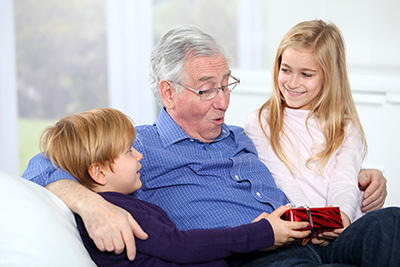
The Best Father’s Day Gift of All
Father's Day is the perfect opportunity to tell your father, your grandfather, and your great-grandfather (if you are blessed enough to still have him around) how much you love and enjoy them. Maybe you also want to celebrate other special senior men in your life who have given you guidance and support. Gift trends for them change throughout the years, but the sentiment stays the same. Ties, slippers, and aftershave have given way recently to noise-cancelling headphones, fitness tracking devices, and trendy mustache waxing kits.
We asked some of our Jewish Home residents about memorable presents they have received for past Father's Day holidays. Artie Kessler still has a handprint in clay his daughter Judy made for him one year when she was little. She now has two daughters of her own. Artie considers his granddaughters to be special Father's Day gifts, too.
Jesse Cooperman remembers receiving a surprising present from his wife in the 1970's. They were vacationing at their home up in Big Bear Lake, California. "On Sunday morning, which was Father's Day, my wife drove into town to get the newspaper," he told us. They had three children at the time. "She came back with a 14-foot sailboat on a trailer hitched to the back of the car." He was bowled over by her thoughtfulness. An avid sailor since he was 13 years old, Jesse loved taking his small boat out by himself on the lake. "It was my quiet time," he said. He kept the boat even after they sold the vacation home.
Cyril Manson has two sons, five grandsons, and is expecting a great-grandchild soon. He has received many presents of socks, ties, shirts and cologne for past Father's Day celebrations. But lately he tells his family not to bother getting him presents. "As long as they think of me and care for me—that's enough," he said. No matter how you choose to appreciate them, the fatherly figures in your life are treasures. Letting them know that is the best gift of all.
May
29
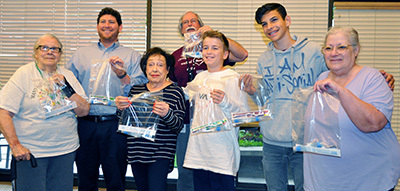
Students and Residents Work Together to Help the Homeless
Recently students from Heschel Day School in Northridge joined hands with residents at the Eisenberg Village campus of the Los Angeles Jewish Home to create hygiene kits for homeless people. Both groups of people were independently looking for an opportunity to give back to the community. Heschel's Rabbi Scott Westle and the Home's Rabbi Ron Goldberg thought the two populations would love to collaborate on this worthwhile project—and so they did.
"It's a wonderful program," said Rabbi Goldberg. "This is a good chance for our residents to engage in social activism and contribute to the larger community around us." Rabbi Westle noted, "It's intergenerational dialogue and community problem solving. The real magic that stems from this event is the conversations the students are having with the residents sitting next to them."
The seventh graders researched the problem of homelessness and decided hygiene kits would bring aid, comfort, and dignity to those without permanent housing. Over 200 finished kits were given to LA Family Housing, an organization that helps homeless people regain their footing in society.
The Home's residents—whose average age is 92—enjoyed kibitzing with the 12- and 13-year olds. "This was so wonderful," said resident Karen Meyer. "I'm so proud of the kids for coming." Audrey Berger commented, "The kids had a ball!" And Shoshana Oshradt was thrilled the Home participated in a program like this. "There is nothing out there like the Jewish Home," she said. "Rabbi Ron is terrific!"
The Heschel Day School students were just as happy about the occasion. Student Leila said, "We worked together with people of different ages to help the homeless." Rabbi Westle summed up the event by saying, "Our students created a product to make the lives of the homeless better. They also networked with a population to whom they don't normally have access." The making of the kits lasted only 15 minutes, but the students and residents chatted together for an hour.
May
18

The Ten Commandments
There is no such thing as the Ten Commandments. At least our ancestors did not call them the “Ten Commandments.” Why would they? Not all 10 of them are commandments. Take the first one, for example: “I am God.” That is a statement, not a commandment. Our ancestors noticed the difference.
In Hebrew, the name of what we in English call the Ten Commandments is “Aseret Hadibrot,” which means the Ten Utterances or the Ten Statements or the Ten Declarations. Here they are in brief just to refresh your memory:
I am GodYou shall have no other gods but meDon’t take God’s name in vainRemember the Sabbath (Shabbat)Honor your father and your mother
No murderNo adulteryNo stealingNo false testimonyDon't covet
Of these ten, which do you think is the most important? I can tell you which I think is the least obvious and also the most insightful. Least obvious because if you assembled a random group of people who did not know of the ten commandments and asked them to write ten, it is unlikely they would come up with this one. And most insightful—because it is this commandment that is the most psychologically astute. It is the tenth one: You shall not covet. The Hebrew, lo tachmod, means “do not be obsessively jealous.” In full it reads:
You shall not covet (be obsessively jealous of) your neighbor’s house. You shall not covet your neighbor’s wife, nor his servants, nor his cattle, nor anything that is your neighbor’s.
This commandment is amazing! It tells us so much about human nature. First of all, consider what a house was like 3500 years ago, when the Torah was written. A shack? A cave? A hut? What could possibly have been so nice about your neighbor’s “house” that you would be jealous? Nicer dirt on his or her floor? There must be something in human nature that makes us envy our neighbors, acquaintances and even strangers, regardless of whether their lives are substantively better.
Also noteworthy here is that the Torah rarely dictates how we should feel. Much more commonly the Torah instructs us on behavior. So why is it that in this one commandment we are told how we should not feel?
The instruction seems to be precautionary. If you are jealous of the other then that jealousy could lead to regrettable behavior. And if you are jealous of the other then you are missing out on the gifts of your own life. Judaism wants us to count our blessings, to be grateful for what we have. The Talmud instructs: “Who is rich? The one who is grateful for what she/he has.”
Shavuot is coming. On that holiday we study and chant the Ten Commandments. Let us rejoice, on that day and every day, in the gifts of our lives! Maybe then, instead of worrying about what our neighbor might have that we lack, we will worry about what others may lack and how we can help them out.
May
14

The Power of Sleep
A good night's sleep is a powerful tonic, promoting both physical and mental well-being. American Academy of Sleep Medicine (AASM) President Dr. Safwan Badr says, "Sleep is a necessity, not a luxury. You must sleep well to be well." The AASM notes that poor sleep is linked to problems such as obesity, high blood pressure, and Type 2 diabetes. Interrupted sleep or not enough sleep can leave you feeling tired, irritable, sluggish, and hungry the next day. As we get older, we have less deep sleep at night. We also experience fewer episodes of Rapid Eye Movement (REM) sleep, the part of sleep where dreams occur.
Here are 10 tips for good sleep hygiene.
Stick to a regular sleep schedule, going to bed and waking up at the same time every day.Practice a relaxing bedtime ritual such as watching television or reading, but not on a tablet or device emitting blue light, such as your cell phone. Some people keep blue-light-emitting devices out of the bedroom altogether.Avoid napping in the afternoon as it can reduce your body's drive to sleep at night.Exercise daily, preferably in the morning or afternoon—the more rigorously, the better.Keep your bedroom dark, quiet, and cool. The National Sleep Foundation recommends a temperature between 60 and 67 degrees Fahrenheit.Sleep on a comfy mattress with good pillows.Avoid bright light in the evening, but let the sun shine in through the windows in the morning to keep your body's circadian (internal clock) rhythms in good order.Avoid caffeine, cigarettes, heavy meals, and alcohol in the evening. The Division of Sleep Medicine at Harvard Medical School notes that alcohol, while initially relaxing, acts as a stimulant after a few hours.If you lie awake in bed for more than 20 minutes, get up and move to another room. Read or listen to music until you feel tired enough to sleep, then go back to bed. The bedroom should be dedicated to sleeping only.When all else fails, some doctors recommend prescription sleep aids which are short-acting and won't leave you groggy the next day. Please consult a physician before taking any medication.
Note: some sleeping problems or interruptions are caused by underlying medical conditions such as sleep apnea, restless leg syndrome, or narcolepsy. If you suspect this might be the case for you, see your medical doctor or a sleep specialist.
May
7
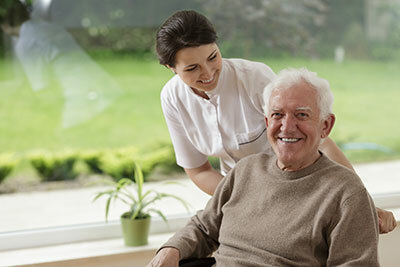
Jewish Home Care Services: There’s No Place Like Home
In need of home health care for you or a loved one? Let Jewish Home Care Services (JHCS) bring the care you need right to your home! JHCS provides services to adults who require skilled nursing or rehabilitative care in their homes due to a medical condition. When recovering from a surgery, injury, or accident, home healthcare can be an excellent option to help you get back on your feet in the comfort of your own home.
Home healthcare enables a patient’s physician to prescribe and develop an individualized plan of care in coordination with the patient and with JHCS. Services are provided by our multidisciplinary team members, who include a medical director; registered nurse; licensed vocational nurse; certified home health aide; physical, occupational, and speech therapists; a medical social worker; and dietary services.
JHCS services include:
assessing physical status, functional level, and potential for rehabilitationproviding therapeutic rehabilitative training programs to improve the patient’s ability to carry out activities of daily living. These include:bathing and showeringpersonal hygiene and groomingdressingtoilet hygieneself-feedingtransferring (the ability to walk and get in and out of bed, a chair or care)providing counseling related to the impact of illness and assists with referrals to community resources.
Some of our specialty services include infusion therapy, wound care, diabetic management, and rehabilitation.
Jewish Home Care Services is a Medicare certified and JCAHO accredited home health agency of the Los Angeles Jewish Home. For more information, please call (818) 655-0411 or visit our Home Care Services page.
May
1

Join Us for the World’s Largest Mother’s Day Celebration
On Sunday, May 13, 2018, the Jewish Home will host the twenty-fourth annual World's Largest Mother's Day Celebration. The event will honor the Home's mothers, grandmothers, great-grandmothers, and even great-great-grandmothers on both the Grancell Village and Eisenberg Village campuses.
The Mother's Day Celebration will begin at 10:30 a.m. Everyone can enjoy a festive brunch while listening – and dancing – to the music of the Skye Michaels Orchestra.
Chaired by Debbie Weiss and Marcie Weiss, the event promises to provide a wonderful opportunity for 1,000 seniors and their families to gather together to celebrate this special day.
Tickets for adults (age 12 and older) are $25.00 each and children's tickets (ages 5-11) are $12.00 each. There is no charge for Jewish Home residents and children under age 5. Tickets must be purchased by Wednesday, May 9th.
For more information and to purchase tickets for the World's Largest Mother's Day Celebration, please contact Denise Horowitz at [email protected] or (818) 774-3324.
Apr
17
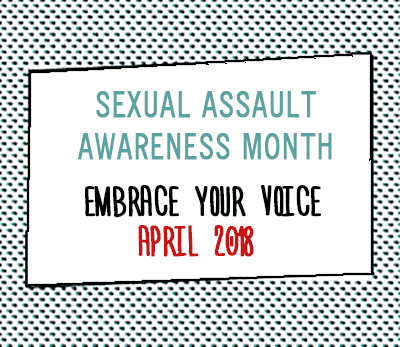
Embrace Your Voice - SAAM
April is Sexual Assault Awareness Month (SAAM). Every year, the National Sexual Violence Resource Center (NSVRC) leads a campaign to educate and engage the public in addressing this widespread issue. The theme for this year’s campaign is Embrace Your Voice.
Recent high-profile cases of sexual assault have propelled this serious matter into the international spotlight. Supported by the #MeToo movement, women and men of all ages, ethnicities, faiths, and economic backgrounds are making their voices heard by sharing their stories. One voice has power; many voices together take that power to an entirely different level. This power can bring about change.
What is sexual assault? According to NSVRC, sexual assault is part of a broader term, sexual violence, which includes rape, incest, child sexual abuse, intimate partner violence, sexual exploitation, human trafficking, unwanted sexual contact, sexual harassment, exposure, and voyeurism. Nearly 1 in 5 women in the United States has experienced rape or attempted rape at some time in their lives, and 1 in 67 American men has also been victims of this violence. One in two women has experienced sexual violence other than rape in her lifetime. For men, that number is 1 in 5. Anyone at any age can experience sexual violence. Those who sexually abuse can be acquaintances, family, trusted individuals, or strangers. Of these, the first three are most common.
How we talk about sexual violence matters. The things you say every day send a message about your beliefs and values. When you stand up for survivors of sexual violence, you send a powerful message that you believe and support them. In the words of NSVRC, your voice has power. Believe survivors. End victim blaming. Ask for consent. Respect boundaries.
It takes courage to tell your story. Jewish Home resident Leslie Scales was brave enough to tell someone what was happening to her, and they helped her find a safe place… the Jewish Home. Here Leslie talks about her experience and the new life she has found at the Home.
Apr
12

Remembering Heroes Too
This month we commemorate Holocaust Memorial Day, to honor the six million Jews, including 1.5 million children, who died in the Holocaust at the hands of Nazis and their collaborators. Naturally it is a very solemn day in Israel and among the international Jewish Community. Here, at the Los Angeles Jewish Home, we have many Holocaust Survivors as residents. As you can imagine, our observance does not feel like a historical reflection, but rather like a real and living recall of an unprecedented horror. Our survivors are amazing, strong, inspiring. On their behalf we promise to never forget.
What many people do not realize is that "Holocaust Memorial Day" is not actually the name of the holiday. And its translation, "Yom Hashoah," is not the name of the holiday in Hebrew. The full name of the holiday is Yom Hazikaron laShoah v'la'Gvurah, which means, "Remembrance Day of the Holocaust and of Heroism."
Notice the difference.
By remembering to add the word, "Heroism," we shift the focus to include something positive. This is not a day when we only remember the 6 million who were taken. We also remember the courageous survivors. In addition, we honor those who struggled against the Nazis, like those who fought to the death during the Warsaw Ghetto uprising. Moreover, we celebrate the many Christian Rescuers and Righteous Gentiles who risked or gave their lives resisting evil and saving Jews.
There are the famous four people who helped to hide Anne Frank's family: Miep Gies, Johannes Kleiman, Victor Kugler and Bep Voskuijl. And thanks to Steven Spielberg, we know about Oskar Schindler's heroic rescue of 1200 Jews. Israel acknowledges the Righteous Among the Nations with trees planted at Yad Vashem, the memorial in Jerusalem.
But we must also remember the many brave and virtuous who were surely anonymous. A farmer here, a neighbor there, that never received credit for resisting evil and rescuing Jews if they themselves were caught or if those they attempted to protect were eventually captured. Indeed Viktor Frankl, the Jewish psychiatrist who survived Auschwitz, acknowledged that even there he observed Nazis who defied orders and tried to help inmates.
Even amid the darkness there are inspirational lights.
What does this mean for us in 2018? Of course we have an obligation to remember the Holocaust. We must also recall the genocide against the Armenian People perpetrated even before the Holocaust. We need to pay attention to world events and not be silent in the face of evil wherever it may happen. "Never again" is a mandate, not an ideal.
A week or so after Yom Hashoah we celebrate Israel's Independence Day, Yom Haatzmaut. Israel turns 70 years old this year! And while the dream of a return to Zion where Jews would be safe and living peacefully with her neighbors in dignity on all sides has not completely come to fruition yet, this old/new State is growing every day and each year. We can be proud of all of Israel's innovations and accomplishments and be grateful that the Jewish People have a homeland again, a place to which we can always return home.
Apr
5
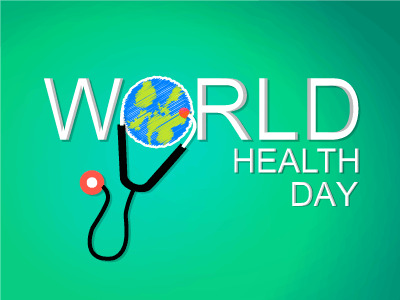
The World Health Day Q & A
Saturday, April 7, is World Health Day. It’s an important day and one with which we should all be familiar.
Here are six things you need to know about World Health Day.
Q. Who is behind World Health Day?
A. The World Health Organization (WHO). WHO was founded in 1948 and is the leading global health authority within the United Nations system. This year marks their 70th anniversary.
Q. Does WHO sponsor a World Health Day every year?
A. Yes. World Health Day is a global health awareness day celebrated every year on April 7. Every year a different and specific health concern is highlighted. In recent years, they included depression, diabetes, and food safety.
Q. What is the theme of this year’s World Health Day?
A. For 2018, the theme of World Health Day is “Universal health coverage: everyone, everywhere.” The slogan is “Health for All.”
Q. Why is universal health coverage the focus of this year’s World Health Day?
A. Following are some interesting statistics concerning universal health coverage:
At least half of the world’s population still doesn’t have full coverage of essential health servicesAbout 100 million people are pushed into “extreme poverty” (living on $1.90 or less a day) because they have to pay for health careOver 800 million people (almost 12% of the world’s population) spend at least 10% of their household budgets on health care
Q. What does universal health coverage provide?
A. Universal health coverage allows people to have access to the health care services they need, without causing them financial hardship. It includes the full spectrum of essential, quality services, from health promotion to prevention, treatment, rehabilitation, and palliative care.
Q. What does universal health coverage not provide?
A. Universal health coverage doesn’t provide free coverage for all possible health treatments regardless of the cost since no country can provide all services free of charge. But its goal is to ensure an expansion of coverage of health services and financial protection as more resources become available.
Now that you’re familiar with the key facts about World Health Day, share them with your family and friends so they will be aware of this important day.